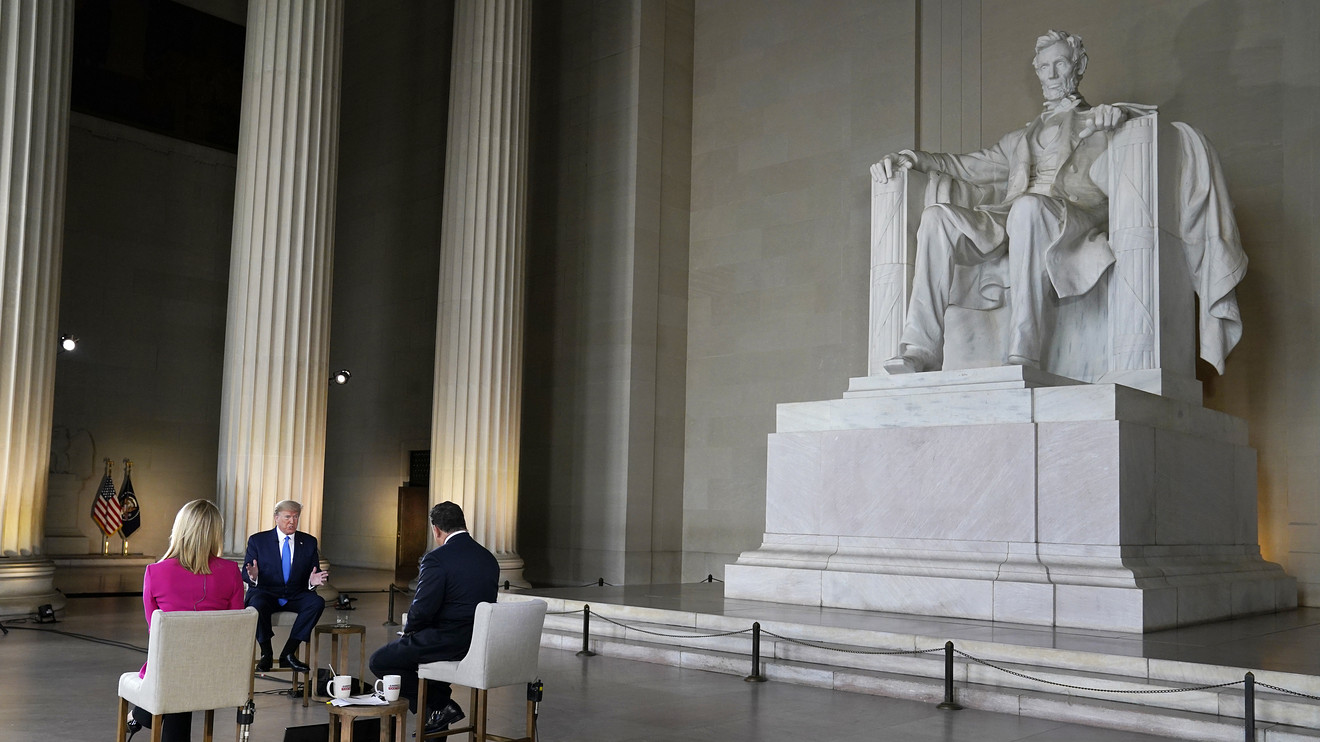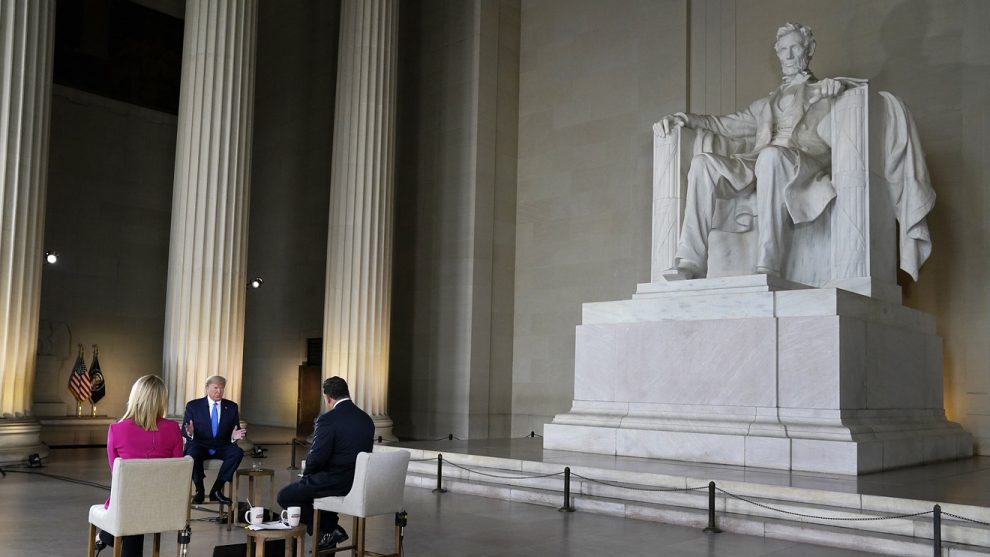
U.S. stocks staged a dramatic comeback late Monday to end higher, as U.S. crude oil settled above $20 a barrel and tensions simmered between China and the U.S. over Beijing’s handling of the coronavirus outbreak.
How did benchmarks perform?
The Dow Jones Industrial Average DJIA, +0.11% managed a gain of 26.07 points, or 0.1%, to end at 23,749.76, well off its session low at 23,361.16, as a rally in Microsoft Corp. MSFT, +2.44% and Apple AAPL, +1.41% helped to more than offset declines in Caterpillar CAT, -2.85% and Walt Disney & Co. DIS, -2.19%
Meanwhile, the S&P 500 SPX, +0.42% gained 12.03 points, or 0.4%, finishing at 2,842.74, aided by gains in the energy sector SP500.10, +3.70%, rising 3.7%, and information technology SP500.45, +1.42%, up 1.4%. The Nasdaq Composite COMP, +1.22% rose 105.77 points, or 1.2%, closing at 8,710.7, powered by gains in Tesla TSLA, +8.53% and Amazon AMZN, +1.31%.
At session lows, the S&P 500 was down 1.2% and the Dow was 1.5% lower at Monday’s nadir, marking their best intraday turnarounds since March 25 and March 19, respectively, according to Dow Jones Market data.
What drove the market?
Stocks flipped into positive territory late in the session Monday, after U.S. crude settled above $20 a barrel and the U.S. continued to place blame on China for its handling of the pandemic.
“We think this is more about U.S. politics than about China, but the developments are still important,” wrote Lauren Goodwin, economist and multiasset portfolio strategist at New York Life Investments, in Monday commentary, adding that volatility in stocks and credit spreads, are “demonstrating just how fragile valuations can be amid so much uncertainty about the fundamentals.”
President Donald Trump suggested he could punish Beijing by imposing additional tariffs on China last week. On Sunday, U.S. Secretary of State Mike Pompeo, in an interview on ABC’s “This Week, ”said he has seen “enormous evidence” that the virus originated in a laboratory in Wuhan, China. Trump during a Sunday night Fox appearance said: “I think they made a horrible mistake and they didn’t want to admit it.”
At the same time, last week’s losses on major benchmarks were reversed Monday, suggesting investors were taking the increased geopolitical risk in stride.
“Investors have gotten accustomed to the way the Trump administration floats trial balloons. I don’t anticipate governments will make the same mistake of imposing higher tariffs,” Scott Clemons, chief investment strategist at Brown Brothers Harriman, told MarketWatch.
Investors also were considering remarks made by Warren Buffett on Saturday, during Berkshire Hathaway’s BRK.B, -2.58% BRK.A, -2.51% annual shareholder meeting, which was held via webcast. The venerated, 89-year-old investor underscored how much uncertainty the virus has created in financial markets, including for airlines.
See: GE’s stock dives after Warren Buffett’s negative outlook, ‘permanent’ job cuts at Aviation
Buffett said Berkshire dumped its entire stake in airline-sector stocks, while the insurance and investing conglomerate also built up a record cash pile of $137.2 billion during the height of the coronavirus-induced rout in markets.
Meanwhile, a release of purchasing managers indexes Monday for several Western European countries showed that coronavirus lockdowns sent manufacturing activity to all-time lows in Germany, France, Spain and Italy in April.
As for the U.S., an attempt to restart the economies of dozens of states hasn’t come without problems, amid warmer weather that has lured larger gatherings of people out onto the streets in the midst of the worst viral outbreak in more than a century.
“We have this natural experiment in those states that have adopted a more aggressive approach to reopening. We’ll know whether that accelerated reopening will pay off or not,” said Clemons.
Trump, fielding questions from a virtual town-hall meeting Sunday night aired by Fox News, suggested that the need is strong to reopen the country’s businesses, which have been closed due to measures in place to slow down the spread of the deadly disease.
“We have to get it back open safely but as quickly as possible,” he said.
Trump’s comments come as the economy has gone into contraction, with data for the first quarter showing that a 4.8% decline in the annual rate of growth, while more than 30 million people, and counting, have filed for unemployment benefits since the end of February.
Against that backdrop, markets still have rebounded from March lows on hopes of success with experimental treatments for the deadly disease, including Gilead Sciences’ GILD, +0.37% remdesivir, and signs of a stabilization of new cases.
In economic data, U.S. factory orders sank 10.3% in March, and orders for long-lasting goods slumped 14.7%.
Which stocks and companies were in focus?
- Shares of Phillips 66 PSX, +10.72%, Valero Energy Corp VLO, +8.33% and Marathon Petroleum Corp MPC, +7.83% led the S&P 500 energy sector higher.
- Buffett’s comments on airlines on Saturday sent shares tumbling of Delta Air Lines Inc. DAL, -6.42%, American Airlines Group Inc. AAL, -7.70%, United Airlines Holdings UAL, -5.10%, and Southwest Airlines Co LUV, -5.71%. Shares of Delta lost 6.4%, American Airlines fell 7.7%, and Southwest shed 5.7% and those for United Airlines fell 5.1%
- An airline-focused exchange-traded fund U.S. Global Jets ETF JETS, -4.32% lost 4.3%.
- Dow component Boeing Co. shares were 1.4% lower on Monday, after Buffett on Saturday referred to the aeronautics and defense contractor as “hard to evaluate.”
- General Electric GE, -4.46% said its division producing aircraft engines would cut roughly 13,000 jobs as the coronavirus curtailed demand for air travel. The conglomerate’s stock fell 4.5%.
- Tyson Foods shares TSN, -7.81% tumbled 7.8% after the company missed its fiscal second-quarter earnings estimate.
- Shares of Starbucks Corp. SBUX, -2.57% fell 2.6% after Fitch cut the credit rating of the coffee-chain company down to two notches above “junk,” or below investment-grade.
- In nonpublic company news, J.Crew Group Inc. said Monday it has filed for chapter 11 bankruptcy protection with $400 million in debtor-in-possession financing from its lenders to help it restructure.
How did other markets trade?
West Texas Intermediate crude oil for June delivery CLM20, +7.07% CL.1, +7.07% scored a gain Monday, adding 61 cents, or 3.1%, to settle at $20.39 a barrel on the New York Mercantile Exchange.
In precious metals, the price on an ounce of gold for June delivery GCM20, +0.57% climbed for a second session in a row, advancing $12.40, or 0.7%, to settle at $1,713.30 an ounce, as the metal found support in U.S.-China tensions and weak economic reports.
The yield on the 10-year U.S. Treasury note TMUBMUSD10Y, 0.640% edge less than a basis point lower to 0.636%, as markets weighed the U.S. Treasury’s plans to borrow a record $3 trillion in the second quarter.
In Asia overnight, stocks closed mostly lower, as the Hang Seng Index HSI, -4.17% fell 4.2% and Korea’s Kospi Composite Index 180721, -2.68% retreated 2.7%. Markets in Japan and China were closed for holidays.
In Europe, shares finished lower, with the Stoxx Europe 600 SXXP, -2.65% ending down 2.7%, and the FTSE 100 UKX, -0.16% closed Monday trade 0.2% lower.
Joy Wiltermuth contributed reporting











Add Comment